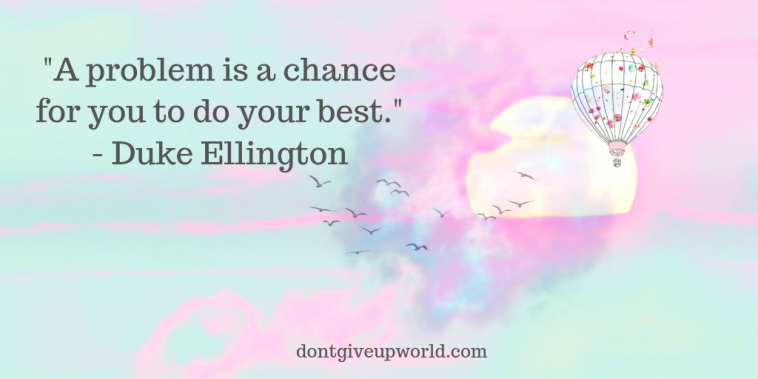
Quote on the problem by Duke Ellington
“A problem is a chance for you to do your best.”
– Duke Ellington
Turning Challenges into Triumphs: Embracing Opportunities
Introduction
In the tapestry of life, problems are not mere stumbling blocks; they are stepping stones toward greatness. The timeless adage, “A problem is a chance for you to do your best,” encapsulates the essence of resilience and growth. Let’s explore this profound truth through the lens of inspiring stories.
**## The Broken Wings: A Tale of Perseverance
Once upon a time in the quaint village of Elmwood, lived a young girl named Evelyn. She dreamed of soaring high like the birds that graced the azure sky. But fate dealt her a cruel hand—Evelyn was born with a congenital disability that left her legs weak and fragile.
The Problem Unfolds
Evelyn faced ridicule and exclusion. Her classmates played tag while she watched from the sidelines. Yet, within her heart, a spark ignited—a chance to prove her mettle.
The Transformation
Evelyn’s parents enrolled her in an art class. With trembling hands, she held the brush, creating vibrant worlds on canvas. Her disability became her muse, pushing her to paint with fervor. Each stroke whispered, “This is your chance.”
The Triumph
Evelyn’s art caught the eye of a renowned gallery owner. Despite her physical limitations, she held her first exhibition. The title? “Broken Wings.” Her paintings spoke of resilience, vulnerability, and soaring beyond constraints. Evelyn’s disability transformed into her greatest asset.
**## From Factory Floors to Fortune
In the bustling city of Newbrook, Henry, a factory worker, toiled day and night. His monotonous routine weighed heavy on his shoulders. But one day, the factory shut down—a problem that seemed insurmountable.
The Problem Unfolds
Henry faced unemployment, bills piling up, and a family to feed. Desperation gnawed at him. Yet, he remembered the quote etched in his heart: “A problem is a chance for you to do your best.”
The Transformation
Henry attended night classes, learning about entrepreneurship. His passion for woodworking ignited. He carved intricate designs, turning discarded factory wood into exquisite furniture. His disability—lack of formal education—became his driving force.
The Triumph
Henry’s small workshop flourished. His creations adorned upscale homes, and he named his business “From Ruins to Riches.” The problem that shattered his routine became the catalyst for his success.
For More Info Click Here
More Such Article Click Here




GIPHY App Key not set. Please check settings